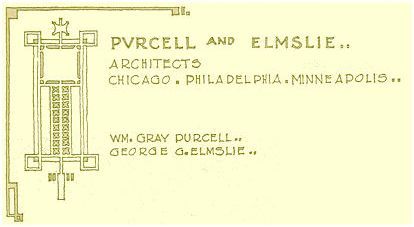 |
firm active: 1907-1921 minneapolis, minnesota :: chicago, illinois |
Citizen's Savings Bank, project
Purcell, Feick and Elmslie<
Cedar Falls, Iowa 1911
Text by William Gray Purcell
Parabiographies entry, Volume for 1911
Job Date (in Parabiographies): January 1, 1911
Citizens Savings Bank, Cedar Falls, Ia.
Two trips were made to Cedar Falls in an effort to secure the commission for this building. I was unable to convince the officials of the qualities resting in our design, and they gave the work to a Chicago architect who was offering a very cheap variation of the standard Roman temple bank of the day.
The loss of this commission was a great disappointment because I felt then and still feel that we were offering them not only a very distinguished piece of architecture but an unusually direct and practical building with a very much larger than usual rentable space for offices in the second floor, and a construction that promised the best building for the lowest cost.
Country Banking
One of the interesting events connected with these trips to Iowa was the story of the banker who ran the other bank in the same town, and perhaps here is the real reason why we lost the commission. The other bank was the forward-looking competitor while this one was trying to make up in shirt front what they lacked in banking ability. But ideas were exactly what they couldn't put up with, as it was ideas and plenty of them that were bringing success to the other bank. This competitor of theirs was a progressive small town idealist. He was the first banker in the United States to proceed on the principle that the customer was entitled to information about the way in which his money was handled, and in a form which he could understand, no matter how little, about the banking business, he knew.
The bank's annual statements, therefore, were not issued in the conventional set up of debits and credits, with technical labels which nobody but a banker could understand, but all was set forth with clarity, in simple descriptive titles, and in brief non-bookkeeping explanations of their significance, both to the bank and to the customer, so that anyone could readily understand them.
His next step was to make his bank the headquarters for anything and everything in the way of information needed by the community. He kept the names and telephone numbers of all the nurses and doctors within a radius of a hundred miles, and saw to it that the experts were on the job in the most remote farm before the baby arrived. He spent as little time as possible in the bank, made it a point to be out around the country every day, rain or shine, calling on his customers, visiting his clients at their farms, no matter how remote or humble their circumstances. In short, he put into effect practical services to his customers, which still figures largely in bank advertising, but which in practice appears as little more than a polite gesture. Too many bankers today are ready to give lots of service if it can be done without getting out of their chairs, and providing the customer is politically sound, socially pure, untainted by manual labor, and carries prestige of some kind in "business circles."
This small town banker's reputation grew until he was talked about all over the United States, and an article about his methods appeared in one of the British newspapers with a reproduction of one of his semi-annual statements. He was offered a vice-presidency in the old Corn Exchange Bank in Chicago, which he accepted. After two years he said that there was something more to life besides drawing a big salary and having an important job. He missed the human contacts and the personal satisfaction that came to him from his little bank in Cedar Falls, so he resigned his Chicago position and went back to the country.
So we lost a job and were given a view of the new day in American business.
Collection: William Gray Purcell Papers, Northwest Architectural Archives, University of Minnesota [AR:B4d1.5]